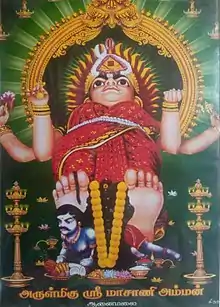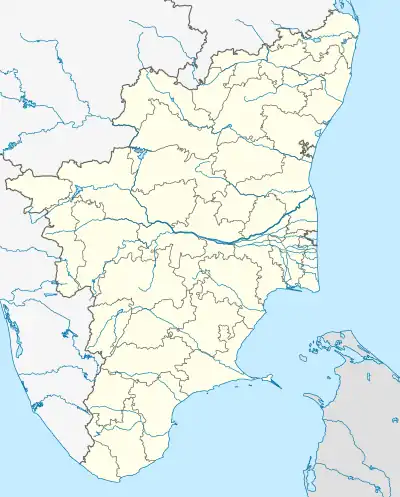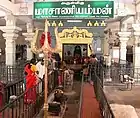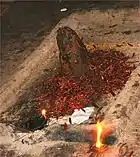Masani Amman
Masani Amman is a Hindu deity. She is primarily worshipped as a clan deity by certain classes in Tamil Nadu, where she is regarded as an avatar (manifestation) of Mahadevi.[2] Her temple is located in Anaimalai, Pollachi, Coimbatore district of Tamil Nadu state, India.[3][4]
| Masani Amman | |
|---|---|
 Poster of Masani Amman | |
| Religion | |
| Affiliation | Hinduism |
| District | Coimbatore |
| Location | |
| Location | Anaimalai |
| State | Tamil Nadu |
| Country | |
 Location in Tamil Nadu, India | |
| Geographic coordinates | 10.5755701°N 76.9348486°E |
| Architecture | |
| Type | Dravidian architecture |
| Completed | before 1000 CE[1] |
| Website | |
| Official Website | |
Arulmigu Masani Amman Temple (alternatively Anaimalai Masani Amman Temple) is a highly revered shrine situated in Anaimalai, which is located about 24 km (15 mi) southwest of Pollachi. At the confluence of the Aliyar River and the Uppar stream, the temple is built on grassland near the Anaimalai Hills, and enshrines the goddess Arulmigu Masani Amman as the presiding deity. She is seen in a unique lying posture, measuring 15 ft (4.6 m) from head to foot. In her four hands she holds a drum, a skull, a snake, and a trident.[5] Other deities worshiped in the complex include neethi kal (stone of justice) and Mahamuniappan. It is a popular belief that Masani Amman cures any illness if one goes around her trident.[1][6] She also provides relief from menstrual cramps.[1]



Legend
According to local tradition, during ancient times, Anaimalai was known as Nannur and the region was ruled by Nannuran. He protected the fruits of his mango grove by instituting severe punishments for any who ate of them. One day, a woman unfamiliar with these measures ate one of Nannuran's mangoes, so he sentenced her to death. Despite public outcry, the woman was executed, and later Nannuran was killed by the villagers in a battle near Vijayamangalam. People built a shrine to the executed woman. Its deity was originally called either "Masani" (meaning "mango" in old Tamil) or "Shmasani" (Sanskrit for "graveyard", in reference to the woman's untimely end),[5] depending on the version of the legend. Later, the deity came to be known as Masaniamman.[5]
See also
References
- "Sri Masaniamman temple". National Tamil Deity Temples. dinamalar.com.
- Singh, Nagendra Kr (2006). Global Encyclopaedia of the South Indian Dalit's Ethnography. Vol. 2. Global Vision Publishing House. p. 180. ISBN 978-81-8220-167-5.
- "Masani Amman temple". kovaizone.in. Archived from the original on 29 January 2020.
- "Masaniamman Temple". tripadvisor.in.
- "Grind Chillies at Masani Amman Temple and Get Your Wishes Granted!". nativeplanet.com. 5 August 2016.
- Subramanian K R (29 August 2015). "மிளகாய் அரைத்து பூசினால்... நீதி வழங்கும் மாசாணியம்மன்" (in Tamil). oneindia.com.
External links
- Official Website
- Arulmigu Masani Amman Temple, Pollachi
- Temple of Justice in Tamil Nadu
- Shrine as a grievance cell